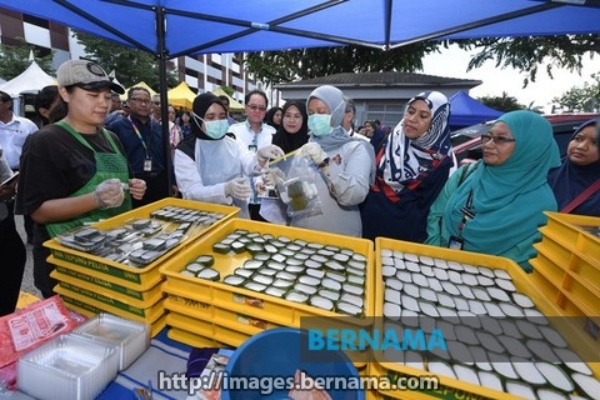DBKL monitoring food safety at Ramadan bazaars

KUALA LUMPUR, May 6 (Bernama) -- Kuala Lumpur City Hall (DBKL) will take 1,500 food samples randomly from 61 Ramadan bazaars for tests to ensure that the food sold is not contaminated and is safe for consumption.
DBKL Health and Environment Department director Datin Dr Noor Akma Shabuddin said the samples would be sent to the Food Quality Laboratory of the department.
"Microorganism analysis will be done on five types of bacteria -- e-coli, coliform, salmonella, bacillus and staphylococcus -- that are closely linked to the personal hygiene of food handlers,” she told reporters after launching the 2019 Ramadan bazaar food safety operation here today.
Dr Noor Akma said the operation would be conducted daily until the final week of Ramadan.
She said that last year 704 food samples were taken for analysis and 207 samples or 29.4 per cent were found to be contaminated.
She said DBKL also conducts operations to check on the use of biodegradable products at Ramadan bazaars.
"They are only allowed to use biodegradable plastic or compostable material which has certification from SIRIM Berhad,” she said, adding that so far this year 330 compounds had been issued to traders caught using non-approved products.
In TAPAH, Perak Menteri Besar Datuk Seri Ahmad Faizal Azumu today reminded food handlers at Ramadan bazaars to observe regulations on food safety and hygiene to ensure that their food is safe for consumption.
He said many cases of food poisoning involving dishes sold at Ramadan bazaars or night markets were reported every year.
"For example, last year an 11-year-old boy died after eating roti jala which was bought from a Ramadan bazaar in Parit, and surely we do not want such an incident to recur,” he said.
Ahmad Faizal told reporters this after launching a state-level food safety operation in conjunction with the Ramadan month.
-- BERNAMA
HealthEdge
EXCLUSIVE

Pet Vaccination, Public Awareness And Surveillance Key Towards Rabies-free Southeast Asia - Experts
KUCHING, Dec 11 (Bernama) -- The goal of making Southeast Asia free from human rabies can be achieved through a total understanding of the disease, how it can be prevented and responsible pet ownership among communities, say experts.
read more ››IN FOCUS

TAVI KAEDAH BAIK PULIH INJAP JANTUNG TANPA PEMBEDAHAN



